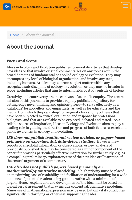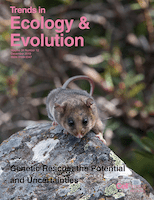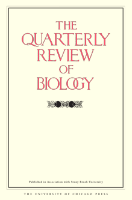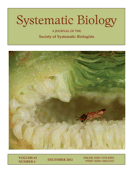
Ideas in Ecology and Evolution
Scope & Guideline
Exploring the Frontiers of Ecological and Evolutionary Thought
Introduction
Aims and Scopes
- Interdisciplinary Approaches to Ecology and Evolution:
The journal emphasizes the integration of concepts from various disciplines to enhance understanding of ecological and evolutionary processes, promoting collaboration between fields such as biology, environmental science, and social sciences. - Theoretical and Conceptual Frameworks:
Focus on innovative theoretical perspectives that aim to reshape existing ecological and evolutionary paradigms, encouraging authors to propose new models that can explain complex biological phenomena. - Sustainability and Environmental Impact:
A consistent focus on sustainability issues, including the implications of research findings on ecological conservation and sustainable practices in academic publishing and broader societal contexts. - Evolutionary Mechanisms and Adaptations:
Exploration of the mechanisms driving evolutionary change, including discussions on adaptation, phylogenetics, and the evolutionary significance of behavioral and physiological traits. - Philosophical and Methodological Reflections in Science:
Encouragement of reflections on scientific methodology, particularly in relation to statistical practices and the philosophy of science, fostering a critical examination of how research is conducted and interpreted.
Trending and Emerging
- Integration of Information Theory in Ecology:
The increasing focus on information theory as a fundamental aspect of ecological and evolutionary research suggests a paradigm shift towards understanding life processes across various scales, emphasizing the role of information in biological systems. - Sustainable Practices in Academic Publishing:
Emerging discussions around sustainable academic publishing practices reflect a growing awareness of the environmental impact of research dissemination, urging a transformation in how scientific knowledge is shared and consumed. - Bayesian Methods in Evolutionary Research:
A rise in the application of Bayesian statistical methods indicates a trend towards more robust and flexible analytical frameworks in evolutionary biology, enhancing the rigor and interpretability of research findings. - Adaptation Mechanisms in Response to Environmental Stressors:
Recent studies exploring mechanisms such as eccrine hydration for drought survival highlight a growing interest in physiological adaptations to climate change, emphasizing the pressing need for research on resilience in natural systems.
Declining or Waning
- Traditional Ecological Studies:
There has been a noticeable decrease in publications focusing solely on traditional ecological studies that do not integrate evolutionary perspectives or innovative theoretical frameworks. - Narrowly Defined Case Studies:
Papers centered on case studies with limited ecological or evolutionary implications are becoming less frequent, suggesting a trend towards broader, more integrative research questions. - Static Models of Evolutionary Theory:
The journal appears to be moving away from static models of evolutionary theory that do not incorporate new data or interdisciplinary insights, reflecting a preference for dynamic and adaptable frameworks.
Similar Journals

AMERICAN NATURALIST
Decoding Nature’s Mysteries, One Article at a TimeAMERICAN NATURALIST, published by University of Chicago Press, stands as a premier outlet for scholarly research in the fields of ecology, evolution, behavior, and systematics. With an impact factor that reflects its high citation rate, the journal has garnered a reputation within the academic community, evidenced by its placement in the Q1 category of its discipline in 2023 and an impressive Scopus rank of #135 out of 721 journals, positioning it in the 81st percentile for Agricultural and Biological Sciences. The journal, established in 1946, continues to uphold its commitment to advancing scientific knowledge through rigorous peer-reviewed articles. Researchers and professionals will find AMERICAN NATURALIST an essential resource, providing insights and discussions that illuminate complex biological phenomena, while fostering a deeper understanding of the natural world. As an essential reading for students and seasoned experts alike, its curated body of work encourages innovative thinking and exploration across an array of ecological and evolutionary topics.

TRENDS IN ECOLOGY & EVOLUTION
Synthesis of Cutting-edge Research in Ecology and EvolutionTRENDS IN ECOLOGY & EVOLUTION, published by CELL PRESS, is a premier academic journal dedicated to the dynamic fields of ecology, evolution, and behavior. With its ISSN 0169-5347 and E-ISSN 1872-8383, this prestigious journal has consistently contributed to the scientific community since its inception in 1986 and is set to continue its legacy through 2024. Ranked in the top quartile (Q1) of its category in 2023, TRENDS IN ECOLOGY & EVOLUTION holds an extraordinary position, sitting at rank #4 out of 721 in the Scopus database for Agricultural and Biological Sciences, specifically within the Ecology and Evolution sectors, reflecting its high impact and relevance in these critical areas of study. The journal's objective is to provide a platform for reviewing and synthesizing the latest research, trends, and advances, thereby influencing the direction of future scientific inquiries. Although it does not currently offer open access options, its insights are invaluable for researchers, professionals, and students eager to delve into the rapidly evolving understanding of ecological and evolutionary processes.

JOURNAL OF ETHOLOGY
Unraveling the Mysteries of Animal DynamicsJournal of Ethology, published by Springer Japan KK, is a prominent academic journal that focuses on the study of animal behavior and ecology. With an ISSN of 0289-0771 and an E-ISSN of 1439-5444, this journal serves as a critical platform for researchers, professionals, and students interested in the intricate dynamics of animal behavior and its ecological implications. The journal is recognized for its contributions to the fields of Animal Science and Zoology, and Ecology, Evolution, Behavior and Systematics, achieving a respectable Q3 quartile ranking in both categories as of 2023. Although it is not an open access journal, it offers extensive research articles and reviews, bridging theoretical and practical aspects of ethology. Spanning an extensive publishing history from 1983 to 2024, the Journal of Ethology aims to disseminate high-quality research that enhances our understanding of animal behavior, fostering interdisciplinary connections and advancing knowledge in animal welfare, conservation, and behavioral ecology.

QUARTERLY REVIEW OF BIOLOGY
Navigating the Evolving Landscape of Biological StudiesQUARTERLY REVIEW OF BIOLOGY, published by University of Chicago Press, stands as a premier journal dedicated to the dissemination of high-quality research and review articles in the field of biological sciences. With an impressive impact factor and an esteemed ranking of Q1 in the Agricultural and Biological Sciences category, the journal is a vital resource for researchers, professionals, and students aiming to stay at the forefront of biological research and developments. Since its inception in 1945, the journal has evolved to cover a broad scope of topics, fostering interdisciplinary dialogue and providing critical insights that promote scientific advancement. Although currently not an open access journal, its reputation is underscored by a remarkable standing in the 95th percentile across Scopus rankings within its field. Located in Chicago, Illinois, this journal continues to be a cornerstone for scholarly communication in biology, making valuable contributions to both academia and practical applications in the biological sciences.

Biology Letters
Advancing biological knowledge through concise communication.Biology Letters, published by the esteemed Royal Society, stands at the forefront of research in the field of biological sciences, with a strong emphasis on innovative studies that bridge gaps across disciplines. Since its inception in 2005, the journal has garnered significant recognition, achieving a remarkable Q1 ranking in Agricultural and Biological Sciences (miscellaneous) and a percentile of 88th in the same category, according to Scopus rankings. Released in the United Kingdom, the journal offers a platform for authors to share concise research findings and theoretical perspectives that contribute meaningfully to the advancement of biological inquiry. Although not open access, the journal remains highly regarded in the academic community for its rigorous peer-review process and impactful content, making it an invaluable resource for researchers, professionals, and students dedicated to exploring the complexities of biology. With an ongoing commitment to excellence, Biology Letters continues to shape the future of biological sciences.

Annual Review of Ecology Evolution and Systematics
Pioneering Research in Ecology, Evolution, and SystematicsThe Annual Review of Ecology, Evolution, and Systematics, published by Annual Reviews, is a leading academic journal dedicated to advancing the understanding of ecological and evolutionary processes. With a commendable impact factor and impressive rankings—9th in both the Ecology, Evolution, Behavior and Systematics category and the Environmental Science category—this journal is recognized for its rigorous peer-reviewed articles that synthesize research findings across a wide range of topics within the fields of ecology and evolutionary biology. Established in 2003, this annual publication aims to provide researchers, professionals, and students with comprehensive insights into the latest developments and trends within these dynamic disciplines. By facilitating access to high-quality scholarly articles, the Annual Review of Ecology, Evolution, and Systematics continues to play a crucial role in fostering scientific discourse and discovery.

Evolutionary Bioinformatics
Empowering discoveries in ecology, evolution, and genetics.Evolutionary Bioinformatics, published by SAGE Publications Ltd, is a pioneering open-access journal established in 2005, dedicated to advancing the field of evolutionary biology through innovative computational techniques and bioinformatics. With an ISSN of 1176-9343, it serves as a critical platform for researchers, professionals, and students to disseminate impactful findings and foster collaboration across disciplines. The journal spans a broad scope, contributing significantly to the areas of Ecology, Evolution, Behavior and Systematics, and Genetics, as evidenced by its respectable Scopus rankings and quartile placements in 2023. With a commitment to providing comprehensive, peer-reviewed research articles and tools for sharing knowledge, Evolutionary Bioinformatics plays an essential role in shaping the future of evolutionary studies and bioinformatics. Readers and contributors alike are encouraged to engage with cutting-edge research that pushes the boundaries of understanding in this dynamic field.

ACTA BIOTHEORETICA
Connecting Agricultural Sciences, Mathematics, and PhilosophyACTA BIOTHEORETICA is a distinguished academic journal published by Springer, offering a vital platform for the dissemination of research within various interdisciplinary fields including Agricultural and Biological Sciences, Applied Mathematics, Biochemistry, Genetics and Molecular Biology, Environmental Science, and Philosophy. The journal, with its extensive history since its inception in 1935, holds a significant impact factor within its respective categories, ranking Q2 in Agricultural and Biological Sciences and Q1 in Philosophy as of 2023. Its archives, spanning from historical publications to contemporary studies, serve as a rich repository for scholars, professionals, and students dedicated to advancing knowledge in these areas. ACTA BIOTHEORETICA invites contributions that push the boundaries of theoretical exploration and practical application, with the aim of fostering an understanding that bridges science and philosophy. Although not open access, the journal maintains wide accessibility through its integrated digital platforms, enhancing the reach and impact of published work worldwide. Its central office located in Dordrecht, Netherlands further accentuates its international appeal and significance.

Systematic Biology
Championing innovative methodologies in biological research.Systematic Biology is a premier journal published by Oxford University Press, dedicated to advancing the field of systematic biology through rigorous research and comprehensive reviews. Established in 1952, this esteemed journal has become a cornerstone of scholarship in Ecology, Evolution, Behavior and Systematics and Genetics, consistently ranking in the Q1 category as of 2023. With an impressive Scopus ranking—19th in Ecology and Evolution and 23rd in Genetics—Systematic Biology offers a platform for the dissemination of groundbreaking research, novel methodologies, and critical discussions that shape our understanding of biological diversity and evolution. While the journal does not currently offer open access options, it maintains a strong commitment to quality and integrity in publishing, ensuring that every article contributes meaningfully to the scientific community. Researchers, professionals, and students alike will find valuable insights and a wealth of knowledge within its pages, supporting their work and fostering a deeper appreciation for the intricate web of life.

Frontiers in Zoology
Pioneering discoveries in animal behavior and systematics.Frontiers in Zoology is a premier, open-access journal published by BMC that has been a cornerstone of zoological research since its inception in 2004. With a commitment to advancing the field, this journal covers a broad spectrum of topics within Animal Science and Zoology, as well as Ecology, Evolution, Behavior, and Systematics. Recognized for its quality, it holds a distinguished Q1 ranking in both of these categories and ranks within the top percentiles in Scopus, with 87th and 78th percentiles, respectively. Based in the United Kingdom, it provides researchers, professionals, and students with innovative studies and findings that encourage interdisciplinary collaboration and exploration. The journal is dedicated to facilitating the open exchange of scientific knowledge, making it an essential resource for those seeking to stay at the forefront of zoological and ecological sciences.